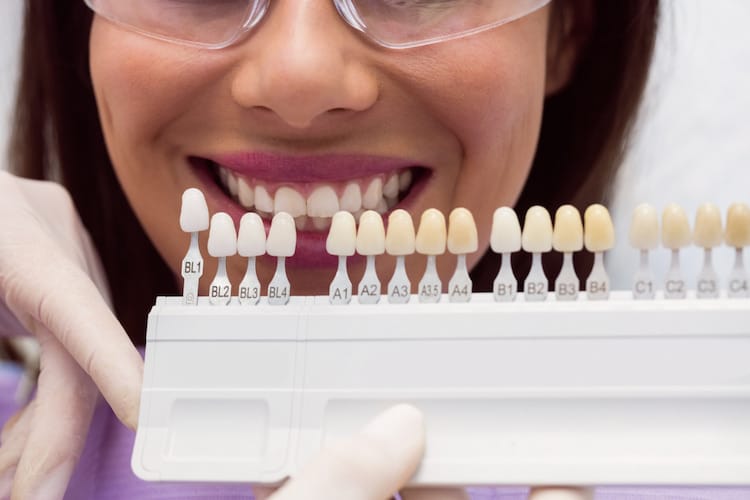With advances in cosmetic dentistry, achieving a bright, attractive smile has never been easier. Dental veneers are an effective and permanent solution to enhance the beauty of your teeth. Transform your smile by addressing issues such as discoloration, chipped teeth, or minor discrepancies. However, because there are many different types of dental veneers available, It can be difficult to decide which option is best for your needs. This article covers the types of veneers and provides comprehensive advice to help you make informed decisions to enhance your smile.
What Are the Types of Dental Veneers?
Dental veneers are thin, custom-made shells designed to cover the front surface of your teeth, improving their appearance by changing their color, shape, size, or length. Veneers are commonly made from either porcelain or composite resin materials, with each type offering advantages based on the patient’s needs and goals.
Let’s take a look at different types of veneers.
Porcelain Veneers
Porcelain veneers are the most traditional and widely used type of veneers. It is known for its high-quality appearance and durability. These types of veneers are made from a type of ceramic material that mimics the natural transparency and texture of real teeth, and provides an ultra-realistic decoration. The veneers are tailored to the shape, size, and color of each patient’s teeth to ensure a seamless appearance that blends in with existing teeth.
Benefits of Porcelain Veneers
One of the main advantages of porcelain veneer is its durability. It is highly resistant to staining and chipping. This makes it an ideal choice for patients looking for a long-term solution to enhance their smile. Porcelain veneers also provide a lifelike appearance to natural teeth thanks to their translucent properties. It will maintain its color over time and generally requires less maintenance than other types of veneers. Porcelain’s flexibility and natural appearance make it a popular choice for patients who value its aesthetic value and longevity.
Ideal Candidates for Porcelain Veneers
Porcelain veneers are best for people who have serious cosmetic problems, such as excessive discoloration, small gaps, or misshapen teeth. They are also suitable for patients who are committed to maintaining their veneers through consistent oral hygiene and regular dental checkups, because veneers usually require a large investment.
Cost of Porcelain Veneers
The cost of porcelain veneers can vary depending on several factors, including the dental practice, the number of veneers needed, and the complexity of the case. Generally, porcelain veneers are among the most expensive options in dental veneers due to their durability and realistic appearance. Patients should anticipate a higher initial investment, with costs potentially ranging from $900 to $3,500 per tooth.

Composite Veneers
Composite veneers are made from a resin material that is carved and placed directly onto the tooth surface. These types of veneers are less expensive than porcelain veneers and can be completed in one visit. This makes it an easy choice for patients who want immediate results. Composite veneers are created to match the patient’s tooth color. This ensures a natural and harmonious appearance.
Advantages of Composite Veneers
They offer the benefit of a more affordable solution for smile enhancement while still providing significant improvement in the tooth’s appearance. Although they may not be as durable as porcelain, composite veneers can be easily repaired if they become damaged. They are also less invasive than porcelain veneers, as they typically require minimal tooth enamel removal, making them a good choice for patients looking for a conservative approach to cosmetic dentistry.
Ideal Candidates for Composite Veneers
These veneers are suitable for:
- Patients with minor cosmetic imperfections, such as small chips or mild discoloration.
- Those who are looking for a cost-effective solution.
- Individuals who prefer a minimally invasive treatment option.
However, composite veneers may not be the best choice for patients seeking a highly durable solution, as they are more prone to staining and wear than porcelain.
Cost of Composite Veneers
In general, composite veneers are less expensive than porcelain veneers. The overall cost depends on the number of veneers required and the complexity of the procedure. At our Newmarket dentistry, they are considered an excellent choice for patients who want to enhance their dental beauty at an affordable price.
Can’t Decide Which Type Best Works for You? We Can Help! At Leslie North Dental, we offer a variety of dental veneers to meet your needs. Our experienced team is here to help you choose the best option for a radiant, long-lasting smile. |
Lumineers
These are a unique type of dental veneers known for their ultra-thin construction. Unlike traditional porcelain veneers, Lumineers are typically around 0.2 mm thick, allowing for application without significant enamel reduction. This makes them a more conservative option in cosmetic dentistry, especially for individuals who prefer minimal alteration of their natural teeth.
Benefits of Lumineers
One of the main advantages of Lumineers is that they require minimal tooth preparation, preserving the natural structure of the teeth. They offer a comfortable and minimally invasive application process, and because they are thinner than traditional veneers, Lumineers also provide a natural appearance that is almost indistinguishable from natural enamel. Additionally, Lumineers are highly durable and can last over a decade with proper care, making them a long-lasting option for patients.
Ideal Candidates for Lumineers
Lumineers are ideal for patients who want a minimally invasive solution to improve their smile. They are also particularly suited for those who wish to preserve their natural teeth as much as possible and are interested in a temporary or reversible option for cosmetic enhancement. However, Lumineers may not be ideal for individuals with significant tooth misalignment or damage, as their thin structure may not provide the required coverage.
Cost of Lumineers
They generally cost between $400 and $2,500 per tooth. While they are more expensive than composite veneers, their minimal invasiveness and durability make them a worthwhile investment for patients seeking a natural-looking and comfortable solution.

Removable Veneers
This one is a temporary alternative to traditional veneers made from flexible resin. They fit over natural teeth and can be removed if necessary. Removable veneers are often marketed as a less expensive, reversible smile enhancement solution. This makes it popular among patients looking for temporary dental cosmetic enhancements.
Benefits and Drawbacks of Removable Veneers
- Removable veneers offer the benefit of flexibility.
- It allows users to improve their smile on demand without a long-term commitment.
- They are generally less expensive than permanent veneers, and there is no need to remove the enamel of the teeth.
However, they are not as durable or realistic-looking as traditional veneers, and will feel thicker in your mouth. It may also not be as effective for patients with complex dental problems or patients seeking long-term cosmetic solutions.
Ideal Candidates for Removable Veneers
Removable veneers are ideal for patients who want a temporary or non-invasive method to improve their smile. They are also ideal for those who are interested in trying veneers or have a limited budget before deciding on a permanent option.
Cost of Removable Veneers
The cost of removable veneers is generally low. That’s why they’re considered the most affordable type of veneer. As a result, they are not intended to replace the durability and aesthetics of porcelain or composite veneers.
How to Choose the Right Type of Dental Veneers
When choosing between veneer types, it’s essential to weigh the importance of aesthetics versus durability. These are the necessary things to know before getting dental veneers. For example, porcelain veneers give you a highly realistic, long-lasting solution but require a more significant initial investment. On the other hand, composite veneers, while less expensive, may require more frequent replacement or repairs. Also, Lumineers offer a minimally invasive option with excellent aesthetics, but their ultra-thin design may limit coverage for severe cases.
To make the best choice, consider your budget, how long you want the veneers to last, and how natural you want them to look. It’s also helpful to talk to your dentist, who can guide you on which type will work best for your needs.
Conclusion
As reviewed in this blog, dental veneers come in various types, such as porcelain, composite, Lumineers, and removable veneers. They offer different advantages and have their own possible downsides and cost range. Choosing the best type depends on your desired aesthetics, longevity, and budget.
You can also get professional help by contacting our team at Leslie North Dental. We offer various types of dental veneers and are ready to help you choose the best one that works for you. So, why not get in touch with us now?!
At Leslie North Dental, we offer a variety of dental veneers to meet your unique needs. Our experienced team is here to help you choose the best option for a radiant, long-lasting smile. Contact us today to schedule a consultation and transform your smile with confidence!
FAQs
1. Can dental veneers fix gaps between teeth?
Yes, dental veneers are an effective solution for closing minor gaps between teeth. They are custom-designed to fill in these spaces, resulting in a seamless and symmetrical smile.
2. Is the veneer application process painful or invasive?
The application process for porcelain and composite veneers typically involves removing a small amount of enamel, which can cause slight discomfort. However, local anesthesia is used to minimize any pain. Lumineers and removable veneers require minimal to no enamel reduction, making them less invasive options.
3. How Long Do Dental Veneers Last?
Dental veneers typically last 10 to 15 years with proper care. Good oral hygiene, avoiding hard foods, and regular dental visits help maximize their lifespan.
4. Can You Whiten Dental Veneers?
No, dental veneers cannot be whitened. To keep them bright, maintain good oral hygiene, avoid stain-causing foods, and consider professional polishing. If they discolor, replacement is the only option for a lighter shade.




